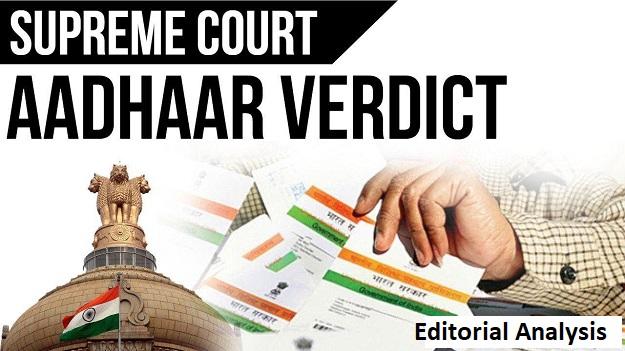Aadhaar Verdict – Supreme Court Judgement on Aadhar Card, Its impact.
The Supreme Court declared the Aadhaar Act, 2016, constitutionally valid
In a 4:1 (4 judges said it is valid but 1 judge said it is not valid) verdict, the Supreme Court found that the Aadhaar Act, 2016, was constitutionally valid.
Not valid is Section 33(2), 47 and 57. It read down Section 33(1).
AADHAAR ACT, 2016
The Aadhaar (Targeted Delivery of Financial and other Subsidies, benefits and services) Act, 2016 is a money bill of the Parliament of India.
It was passed on 11 March 2016 by the Lok Sabha.
NOTES
Bills that do not need the approval of Rajya Sabha are known as Money Bill.
NDA passed this bill as a money bill.
The opposition parties criticised the decision to introduce it as a money bill.
Ghulam Nabi Azad, an INC leader, wrote in a letter to the Jaitley that the ruling party BJP was trying to bypass the Rajya Sabha, as they did not have the majority in the upper house.
CURRENT SITUATION
In the meantime, the Congress party has said they will move the Supreme Court against today’s order that validated the Aadhaar Act as a money bill.
Justice DY Chandrachud in his dissenting verdict said “Bypassing Rajya Sabha to pass Aadhaar bill as a money bill was a fraud on the Constitution.”
Aadhaar is mandatory For
Income Tax Returns (ITR) and allotment of Permanent Account Number (PAN).
Aadhaar card is, however, must for availing facilities of welfare schemes and government subsidies as it empowers the poor and marginalized.
The Supreme Court has made an exception for children saying that no the child can be denied benefits of any scheme if he or she doesn’t have Aadhaar card.
Aadhaar is NOT mandatory For :
Most commercial banks, payments bank and e-wallet companies like Paytm cannot seek Aadhaar data. (Fill only your KYC)
To buy a new SIM card, your telecom service provider cannot seek Aadhaar details from you (provide other KYC documents )
Students of CBSE, NEET, UGC also do not require Aadhaar number to appear in exams. Even schools cannot seek Aadhaar card for admissions.
The apex court (SC) has struck down Section 57 of the Aadhaar Act as “unconstitutional”. This means that no company or private entity can seek Aadhaar identification from you.
WHO DECIDES WHETHER A BILL IS A MONEY BILL OR NOT?
(a) President
(b) Chairmen of Rajya Sabha
(c) Speaker of Lok Sabha
(d) Minister of Parliamentary affairs.
ANSWER C – SPEAKER OF LOK SABHA
• Money Bills can be introduced only in Lok Sabha (the directly elected people’s house’ of the Indian Parliament).
• The definition of “Money Bill” is given in Article 110 of The Constitution of India. A financial bill is not a Money Bill unless it fulfills the requirements of Article 110.
• The Speaker of the Lok Sabha certifies if a financial bill is a Money Bill or not.






















 WhatsApp
WhatsApp